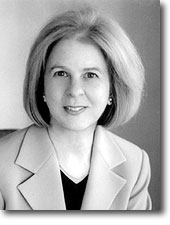Theocracy Watch genre: Hip-Gnosis
"Theocracy Watch" is a recurring posting here at Thought Theater. The intention of the category 'Hip-Gnosis" is to provide information about God, religion, and faith from various perspectives. The postings will attempt to provide the reader with interesting and provocative thoughts and theories that stir debate and discussion. While I have my own beliefs about these topics, I'm always curious to know what others think and the basis upon which they form their own opinions and beliefs.
Elaine Pagels
 This first entry is primarily informational. The material below the fold is from Wikipedia and it profiles Elaine Pagels, a scholar and author I once heard interviewed on National Public Radio as well as on a subsequent CNN piece discussing religion. What strikes me most about her is the apparent sincerity by which she seeks to explore and understand religion. Her writings reflect extensive research and she endeavors to present facts without ideologically leaning conclusons. Anyone interested in historical data about religion would find her appealing and refreshing. I wholeheartedly recommend reading any of her books.
This first entry is primarily informational. The material below the fold is from Wikipedia and it profiles Elaine Pagels, a scholar and author I once heard interviewed on National Public Radio as well as on a subsequent CNN piece discussing religion. What strikes me most about her is the apparent sincerity by which she seeks to explore and understand religion. Her writings reflect extensive research and she endeavors to present facts without ideologically leaning conclusons. Anyone interested in historical data about religion would find her appealing and refreshing. I wholeheartedly recommend reading any of her books.
From Wikipedia, the free encyclopedia.
Elaine Pagels (née Hiesey, born February 13, 1943), is the Harrington Spear Paine Professor of Religion at Princeton University. She was born in California, graduated from Stanford University (B.A. 1964, M.A. 1965) and, after briefly studying dance at Martha Graham's studio, began studying for her Ph.D. at Harvard University. She married theoretical physicist Heinz Pagels in 1969.
At Harvard, she was part of a team studying the Nag Hammadi library scrolls. Upon finishing her Ph.D. from Harvard in 1970, she joined the faculty at Barnard College, where she headed the department of religion from 1974. Her study of the Nag Hammadi scrolls was the basis for The Gnostic Gospels (1979), a popular introduction to the Nag Hammadi library. The bestselling book won both the National Book Critics Circle Award and the National Book Award and was chosen by the Modern Library as one of the 100 best books of the 20th Century. In the book she argued that the Christian church was founded in a society espousing a number of contradictory viewpoints. Gnosticism as a movement was not very coherent and there were several areas of disagreement between different factions. Gnosticism attracted women in particular because of its egalitarian perspective which allowed their participation in sacred rites.
In 1982, Pagels joined Princeton University as a professor of early Christian history. Aided by a MacArthur fellowship (1980–85), she researched and wrote Adam, Eve, and the Serpent, which examines the creation myth and its role in the development of sexual attitudes in the Christian West. In both The Gnostic Gospels and Adam, Eve, and the Serpent, Elaine Pagels examines the way that women have been viewed in Christian history, and thus these texts have been important in the feminist study of religion.
In 1987, Pagels's son Mark died, after four years of illness, and the following year her husband, theoretical physicist Heinz Pagels, died in a hiking accident. In part out of those experiences, she began working on the research leading to The Origin of Satan. This book shows the way that the figure Satan became a way for Christians to demonize their religious opponents, the Jews and the unorthodox Christians.
In 1992, after studying the Pauline Epistles and comparing them to Gnosticism and the early church, Pagels wrote the book The Gnostic Paul. This book expounds the theory that Paul of Tarsus was a gnostic whose influence on the direction of the early Christian church was great enough for the creation of forged additions such as the pastoral epistles (those to Timothy and Titus) to make it appear as if Paul supported their interpretation rather than gnosticism.
Her New York Times bestseller, Beyond Belief: The Secret Gospel of Thomas (2003), focuses on religious claims to possessing the ultimate truth. In this book, she contrasts the Gospel of Thomas with the Gospel of John. A close reading of these Gospels shows that, while John emphasizes that Jesus is the "light of the world", Thomas teaches individuals that "there is a light within each person, and it lights up the whole universe. If it does not shine, there is darkness." Thomas also shares with other supposed secret teachings a belief that Jesus is not God but, rather, is a teacher who seeks to uncover the divine light in all human beings. Pagels argues that the Gospel of John was written as a reaction to the Gospel of Thomas, as a rebuttal to it. Thomas is portrayed in John as a disciple of little faith who cannot believe without seeing, and very strong emphasis is put on accepting Jesus as the center of belief. During the time of persecution of Christians, the church fathers constructed the canon, creed and hierarchy, suppressing some of its spiritual resources in the process, in order to avoid conflict with Roman law and religion.
In addition to the MacArthur award, Professor Pagels is also a recipient of the Guggenheim and Rockefeller fellowships.
Post a comment